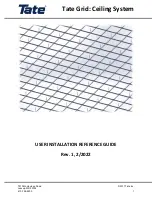
Approved Document No. DAU0000050 Rev
2
• Page 10
Approved Document No. DAU0000050 Rev
2
• Page 3
Familiarisation with your DL50 induction loop amplifier
Below is an overview of the indicators, controls and connectors on your DL50 induction
loop amplifier. The amplifier has one set of phono inputs (for the direct connection of
televisions, etc), two microphone inputs and an alert input (the alert input is normally used
for special applications only). It also includes four screwdriver-adjustable level controls plus
a number of indicators to assist you in setting up the system. Connections are also provided
for the attachment of the induction loop cable.
Detailed connection diagrams, system planning and system set-up information can be
found later in this manual.
LOOP
OUTPUT
CONNECTOR
MICROPHONE
PRIORITY
CONTROL
12V a.c. 1.5A
PLUG-TOP
POWER SUPPLY
CONNECTION
ALERT
INPUT
CONNECTOR
PHONO
INPUT
CONNECTORS
MIC. 1
INPUT
CONNECTOR
MIC. 2
INPUT
CONNECTOR
DL50 amplifier : front view
DL50 amplifier : rear view
TONE
CONTROL
HEADPHONE
SOCKET
INPUT SIGNAL
LEVEL CONTROL
INPUT
SIGNAL
INDICATOR
LOOP
STRENGTH
METER
POWER ON
INDICATOR
LOOP
SIGNAL
CONTROL
(indicates the
power being
driven into
the loop)
If no sound is being picked up by the hearing aid or induction loop test receiver, first check
that the amplifier’s power indicator is lit.
Troubleshooting
If the power indicator IS lit:-
Check that the amplifier’s input signal
indicator is lit.
If the input signal indicator IS NOT lit, make
sure all microphone and audio connection
leads are correctly plugged in.
Adjust the amplifier’s input signal and
microphone priority controls until its input
signal indicator flickers.
If there is still no sound being picked up by
the hearing aid or induction loop test
receiver, check that the loop cable is not
broken or misconnected.
Tip: The loop strength meter WILL NOT
illuminate if there is a break in the loop
cable or if it is misconnected.
If the power indicator IS NOT lit:-
Check that the plug-top power supply is
correctly plugged into the mains supply
and the amplifier.
If the power indicator is still not lit, the
power supply or the amplifier could be
faulty. Return the amplifier and PSU to
your vendor for repair.
























